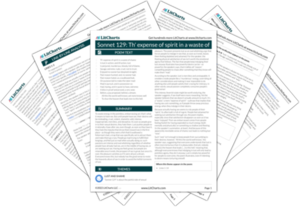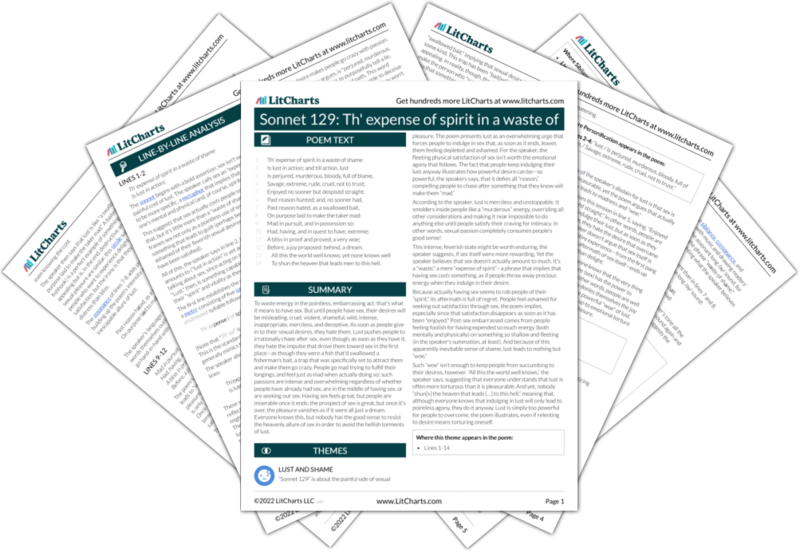
Published in 1609, "Sonnet 129" is part of a sequence of Shakespearean sonnets addressed to someone known as the "Dark Lady." The poem is about the frustrating, torturous side of sex and desire. It presents lust as a "savage," all-consuming force that drives people "mad," pushing them to seek out physical satisfaction at all costs. But when the act of lovemaking is over, people feel ashamed for agonizing so intensely over a pleasure as fleeting (and, to the speaker, emotionally depleting) sex. Everyone knows lust leads to self-loathing, the speaker says, yet simply can't help themselves from indulging; passion is too powerful to resist.
|
Get
LitCharts
|

|

The Full Text of “Sonnet 129: Th' expense of spirit in a waste of shame”
1Th' expense of spirit in a waste of shame
2Is lust in action; and till action, lust
3Is perjured, murderous, bloody, full of blame,
4Savage, extreme, rude, cruel, not to trust;
5Enjoyed no sooner but despisèd straight:
6Past reason hunted; and, no sooner had,
7Past reason hated, as a swallowed bait,
8On purpose laid to make the taker mad:
9Mad in pursuit, and in possession so:
10Had, having, and in quest to have, extreme;
11A bliss in proof and proved, a very woe;
12Before, a joy proposed; behind, a dream.
13 All this the world well knows; yet none knows well
14 To shun the heaven that leads men to this hell.
The Full Text of “Sonnet 129: Th' expense of spirit in a waste of shame”
1Th' expense of spirit in a waste of shame
2Is lust in action; and till action, lust
3Is perjured, murderous, bloody, full of blame,
4Savage, extreme, rude, cruel, not to trust;
5Enjoyed no sooner but despisèd straight:
6Past reason hunted; and, no sooner had,
7Past reason hated, as a swallowed bait,
8On purpose laid to make the taker mad:
9Mad in pursuit, and in possession so:
10Had, having, and in quest to have, extreme;
11A bliss in proof and proved, a very woe;
12Before, a joy proposed; behind, a dream.
13 All this the world well knows; yet none knows well
14 To shun the heaven that leads men to this hell.
-
“Sonnet 129: Th' expense of spirit in a waste of shame” Summary
-
-
“Sonnet 129: Th' expense of spirit in a waste of shame” Themes
-

Lust and Shame
- See where this theme is active in the poem.
-
-
Line-by-Line Explanation & Analysis of “Sonnet 129: Th' expense of spirit in a waste of shame”
-
Lines 1-2
Th' expense of spirit in a waste of shame
Is lust in action; -
Lines 2-4
and till action, lust
Is perjured, murderous, bloody, full of blame,
Savage, extreme, rude, cruel, not to trust; -
Lines 5-8
Enjoyed no sooner but despisèd straight:
Past reason hunted; and, no sooner had,
Past reason hated, as a swallowed bait,
On purpose laid to make the taker mad: -
Lines 9-12
Mad in pursuit, and in possession so:
Had, having, and in quest to have, extreme;
A bliss in proof and proved, a very woe;
Before, a joy proposed; behind, a dream. -
Lines 13-14
All this the world well knows; yet none knows well
To shun the heaven that leads men to this hell.
-
-
“Sonnet 129: Th' expense of spirit in a waste of shame” Poetic Devices & Figurative Language
-
Metaphor
- See where this poetic device appears in the poem.
-
Personification
- See where this poetic device appears in the poem.
-
Irony
- See where this poetic device appears in the poem.
-
Sibilance
- See where this poetic device appears in the poem.
-
Consonance
- See where this poetic device appears in the poem.
-
Assonance
- See where this poetic device appears in the poem.
-
Alliteration
- See where this poetic device appears in the poem.
-
Caesura
- See where this poetic device appears in the poem.
-
Repetition
- See where this poetic device appears in the poem.
-
-
“Sonnet 129: Th' expense of spirit in a waste of shame” Vocabulary
Select any word below to get its definition in the context of the poem. The words are listed in the order in which they appear in the poem.
- Expense
- Spirit
- Lust
- Perjured
- Savage
- Despisèd
- Straight
- Past Reason
- Hunted
- Bait
- Laid
- Mad
- Pursuit
- Possession
- Quest
- Bliss
- Woe
- Shun
-
- See where this vocabulary word appears in the poem.
-
Form, Meter, & Rhyme Scheme of “Sonnet 129: Th' expense of spirit in a waste of shame”
-
Form
-
Meter
-
Rhyme Scheme
-
-
“Sonnet 129: Th' expense of spirit in a waste of shame” Speaker
-
-
“Sonnet 129: Th' expense of spirit in a waste of shame” Setting
-
-
Literary and Historical Context of “Sonnet 129: Th' expense of spirit in a waste of shame”
-
-
More “Sonnet 129: Th' expense of spirit in a waste of shame” Resources
-
External Resources
-
A Reading of the Poem — Watch the actor Ralph Fiennes recite "Sonnet 129."
-
1609 Printing — Take a look at what it would have been like to read "Sonnet 129" when it was first published in 1609.
-
The Bard Himself — Learn more about Shakespeare in this brief overview of his life and work.
-
Shakespeare's Sonnet Sequences — Check out the British Library's simple break down of Shakespeare's 154 sonnets.
-
-
LitCharts on Other Poems by William Shakespeare
-










